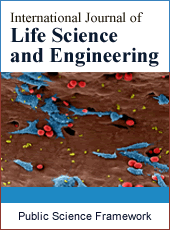International Journal of Life Science and Engineering
Articles Information
International Journal of Life Science and Engineering, Vol.1, No.4, Sep. 2015, Pub. Date: Jul. 20, 2015
Study the Effects of Different Concentrations of Nacl on Germination Lycopersicun esculentum
Pages: 189-191 Views: 4996 Downloads: 2106
[01]
Taha Mohammed Sharief Mohammed, Department of Horticulture, Faculty of Agriculture, University of Zalingei, Zalingei, Darfur, Sudan.
[02]
Saliema Mohammed Abd Elgafa, Department of Horticulture, Faculty of Agriculture, University of Zalingei, Zalingei, Darfur, Sudan.
The ability of seeds to germinate at high salt concentration in the soil is crucial importance for the survival and perpetuation of many plant species. Therefore, we examined effects of different concentrations of NaCl (1ppm, 2ppm, 3ppm, 4ppm and 5ppm) on germination of Lycopersicon esculentum. By this experiment, we wanted to determine which concentrations of salt would not interfere with germination of tomato seeds. The obtained results showed that tomato seeds germination affected by concentration of NaCl (200 mM). However, distilled water. When GA3 was added, seeds of C. annum germinated in great number, but seeds of other plants did not germinate.
Salinity, Tomato, Germination
[01]
Bajji, M., Kinet, J-M., and S. Lutts (2002): Osmotic and ionic effects of NaCl on germination, early seedling growth and ion content of Atriplex halimus. Can. J. Bot. 80, 297-304
[02]
Baskin, J. M. and C. C. Baskin (1998): Seeds: Ecology, Biogegraphy and Evolution of dormancy and germination. Academic Press, San Diego, Calif. U. S. A.
[03]
De la Peña R, Hughes J. Improving vegetable productivity in a variable and changing climate. SAT eJournal (ejournal. icrisat. org) 2007; 4(1): 1–22.
[04]
FAO, 2005. Global network on integrated soil management for sustainable use of salt effected soils. Available in: http/www.fao.org/ag/AGL/ag11/spush/intr.
[05]
Foolad, M. R., J. R. Hyman and G. Y. Lin. 1999. Relationships between cold-and salt-tolerance during seed germination in tomato: analysis of response and correlated response to selection. Plant Breeding, 118: 49-52.
[06]
Khan, A. M., Rizvi, Y. (1994): Effect of salinity, temperature and growth regulators on the germination and early seedling growth of Atriplex griffthii. Can. J. Bot., 72, 475-479.
[07]
Loercher, L. (1974): Persistence of red light induction in lettuce seeds of varying hydration. Plant Physiol. 53, 503-506.
[08]
Parida AK, Das AB. Salt tolerance and salinity effects on plant: a review. Ecotoxical Environ Safety. 2005; 60:324–349. doi: 10.1016/j.ecoenv.2004.06.010. [PubMed] [Cross Ref]
[09]
Reynolds, T. (1975): Characterization of osmotic restraints on lettuce from germination. Ann.Bot. 39, 791-796.
[10]
Sivritepe, N., H.O. Sivritepe and A. Erifl. 2003. The effects of NaCl priming on salt tolerance in melon seedlings grown under saline conditions. Scientia Hort. 97: 229-237.
[11]
Živkovic, S., Devic, M., Filipovic, B., Giba, Z. and Grubisic, D. (2007): Effect of NaCl on seed germination in some Centaurium Hill. Species (Gentianaceae). Arch. Biol. Sci., 59 (3), 227-231.
[12]
Amir N, Muhammad A, Muhammad AP, Irfan A. Effect of halo-priming on germination and seedling vigor of tomato. Afr J Agr Res. 2011;6(15): 3551–3559.
[13]
Cuartero J, Munoz RF. Tomato and salinity. Scientia Horticulture. 1999; 78: 83–125. doi: 10.1016/S0304-4238(98)00191-5. [Cross Ref]
[14]
Essa AT, Al-Ani DH. Effect of salt stress on the performance of six soybean genotypes. Pak J Biol Sci. 2001; 4: 175–177. doi: 10.3923/pjbs.2001.175.177. [Cross Ref]
[15]
Hamed K., Hossein N., Mohammad F., Safieh VJ. How salinity affect germination and emergence of tomato lines. J Biol EnvironSci. 2011; 5(15):159–163.
[16]
Hazer AS, Malibari AA, Al-Zahrani HS, Al-Maghrabi OA. Response of three tomato cultivars to sea water salinity. 1. Effect of salinity on the seedling growth. Afr J Biotechnol. 2006; 5(10):855–861.
[17]
Essa AT, Al-Ani DH. Effect of salt stress on the performance of six soybean genotypes. Pak J Biol Sci. 2001; 4: 175–177. doi: 10.3923/pjbs.2001.175.177. [Cross Ref]

ISSN Print: 2381-697X
ISSN Online: 2381-6988
Current Issue:
Vol. 3, Issue 4, December Submit a Manuscript Join Editorial Board Join Reviewer Team
ISSN Online: 2381-6988
Current Issue:
Vol. 3, Issue 4, December Submit a Manuscript Join Editorial Board Join Reviewer Team
| About This Journal |
| All Issues |
| Open Access |
| Indexing |
| Payment Information |
| Author Guidelines |
| Review Process |
| Publication Ethics |
| Editorial Board |
| Peer Reviewers |


